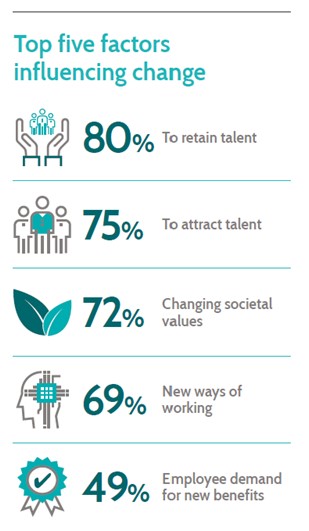Are we at a turning point for reward professionals?
According to REBA’s 2022 Benefits Design research, 44% of businesses expect to make large-scale changes to their benefits strategies over the next two years. The reasons for that change will vary, but talent attraction and retention, new ways of working and shifting employee expectations all play a part.

figures from REBA's Benefits Design Research 2022
Such wide-scale, fast-paced change could give the reward and benefits profession a major credibility boost, says Nick Jackson head of reward at energy technology company Smart DCC.“There is an opportunity for reward and benefits professionals to really increase their profile and say ‘we are here, we are strategic thinkers and we know what we are doing’.”
And, Jackson says, they have the perfect opportunity to raise their profile now as the current economic crisis, combined with the war for talent, means more organisations are turning to their reward and benefits team for strategic support.
On one hand, organisations are struggling to retain staff by navigating the emotive and knotty issues of pay rises and using benefits to help employees’ pay go further and, on the other hand, they are also desperately trying to attract new talent. Achieving both could bring about a step-change for reward and benefits, according to Duncan Brown, principal associate at Institute for Employment Studies (IES).
“When times are good they [reward and benefits professionals] are valued for their influence on recruiting staff in a tight market, which my 2019 HRM strategy research for IES showed,” Brown says. “When times are tough they are valued for supporting employee retention and wellbeing. And in the current unique context we have both.”
Keeping reward and benefits high-profile
Brown says reward and benefits strategy was an important factor in organisations’ response to the Covid-19 pandemic and those in the industry are in a great position to capitalise on having a higher profile.
“HR functions generally did amazingly well in responding to Covid-19 and [are doing so] now in the cost of living crisis, extending their influence at board level and having a direct beneficial impact on employees,” he said.
“The reward and benefits agenda has been crucial to that response throughout and has increased in importance as boards recognise the value of employees and the value of investing in them.”
He adds that the emphasis within benefits has continually shifted in response to external factors, from “physical safety and financial wellbeing in early Covid, then to a focus on employee support and mental health, then wider engagement and communications, and now pay through bonuses and pay restructuring”. Reward and benefits professionals have had to keep pace with that change and maintain momentum – but that has provided them with an opportunity to shine.
The strategic shift
David Wreford, partner at Mercer, says 2022 has been a good year for reward and benefits professionals and adds that its profile has been building for a while.
“We’ve seen it [the importance of reward and benefits] at different stages, partly the extent to which HR is increasing its influence in organisations and the extent to which people in reward and benefits are increasing their influence within HR.”
Wreford highlights the link between HR, reward and benefits and believes that the economy has enabled practitioners to become more involved in strategic conversations. “HR, reward and benefits are having increasing influence in organisations over time.
“Reward roles especially require sophistication, intelligence and rigour and that calls for a high level of skill and capability, more now than ever.”
In a nutshell…
- 2022 is an eventful year for reward professionals who are at the vanguard of helping employees cope with ongoing health and financial challenges.
- Reward and benefits professionals have been included in strategic operations for many years, but as their skills have grown they are becoming more involved with board-level strategy.
- There is an opportunity to raise the profile of reward and benefits professionals still further, with new thinking to meet new challenges.
Challenge the status quo
But Jackson believes more strategic thinking is crucial in the sector.
“We need to argue that we understand the moving parts [in the business] and that we are prepared to change our approach quickly as business needs move. This is a fabulous, fantastic opportunity [for practitioners] to make some headway in the business and get a seat at the board table.”
Jackson also says that 2022 has required reward and benefit professionals to be agile in their response to change – or be left behind. “There’s a risk that people in our specialism might find themselves feeling marginalised over the course of the next year,” he warns. “And is that entirely their employer’s fault or is there some failure within our function to move with the times? I suspect it is a bit of both.”
He believes that reward and benefits professionals need to challenge themselves on “preconceived notions” about the way things have always been done and consider whether the world has moved on. He adds: “I suspect that in a lot of cases, if we are really honest with ourselves, the world has already changed, and we need to keep up.”







